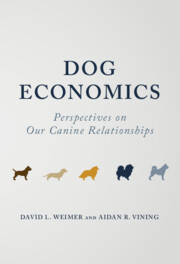
- Cited by 2
-
Cited byCrossref Citations
This Book has been cited by the following publications. This list is generated based on data provided by Crossref.
Sunstein, Cass R. 2024. Regulators Should Value Nonhuman Animals. Journal of Benefit-Cost Analysis, Vol. 15, Issue. 1, p. 1.
Mitchell, Jerry 2025. Animal policymaking in New York City. Journal of Urban Affairs, p. 1.
- Publisher:
- Cambridge University Press
- Online publication date:
- January 2024
- Print publication year:
- 2024
- Online ISBN:
- 9781009445504
- Subjects:
- Economics, Microeconomics, Macroeconomics


